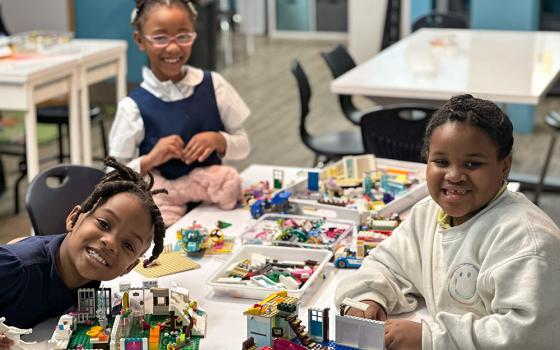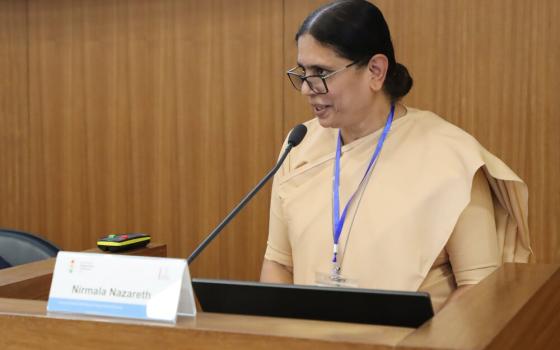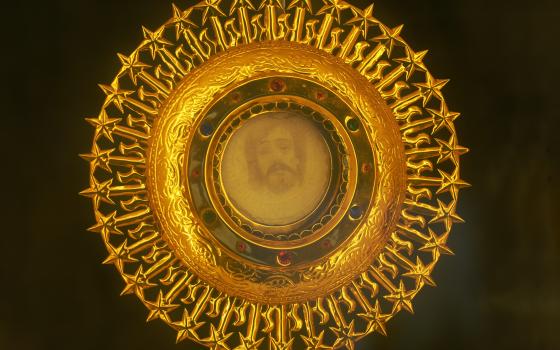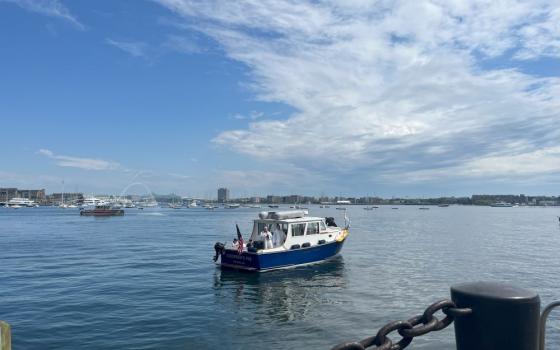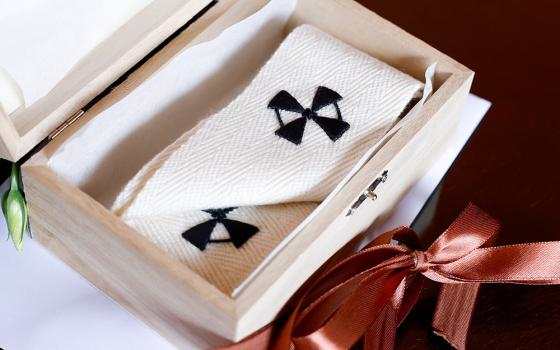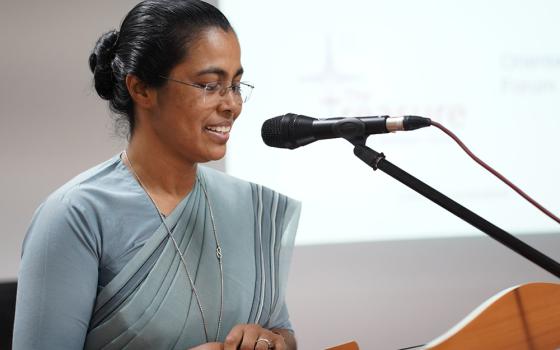
Sr. Ombretta Neri, of the Contemplative Missionary Movement of Charles De Foucauld, visits St. Mary's Infant School in the Rupsha area of Bangladesh and talks to the students. (Stephan Uttom Rozario)
"I used to study by pretending to play," Mohammad Hayder Ali, a Muslim former student of St. Mary's Infant School, told Global Sisters Report. "When I was a child, there was only one school around the slum where I studied — the Blue Sisters' school. I studied here until first grade, then moved to another school."
The Contemplative Missionary Movement of Charles De Foucauld, popularly known locally as "Blue Sisters," started this school in 1983 to cater to the nursery-aged children of the slums in the Rupsha area around 250 kilometers from the capital Dhaka. The sisters of this congregation are known as the Blue Sisters of Bangladesh because they always wear blue clothes.
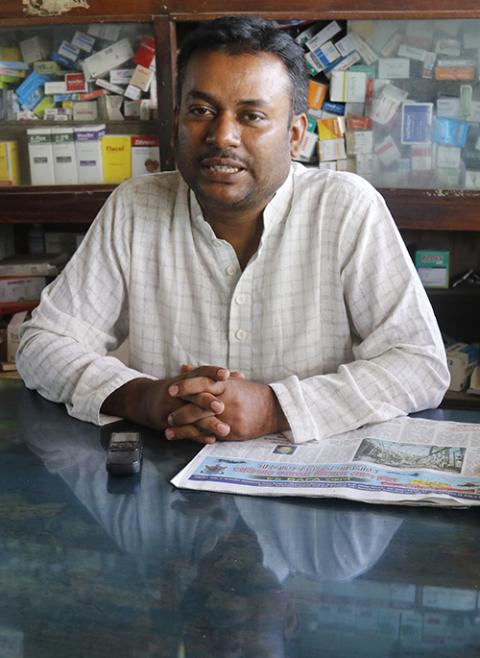
Mohammad Hayder Ali, a Muslim former student of the school, at his pharmacy (Stephan Uttom Rozario)
Ali's parents lived in the slum and his father was a fisherman. He was the only one of his four siblings to study until grade 12. Now he runs a pharmacy business and has purchased land outside the slum with his income.
"The education that I got in our school is not in other schools, the care of the teachers is not in other schools. If we could not do something, the teachers would teach us again and again. My success has been possible because of studying in this school," Ali told GSR.
Ali said there are many schools in the vicinity, but he sent his son to this school up to grade three and later admitted him to an outside school. Around 150 children from the slums are now students at the school.
Surrounding St. Mary's Infant School are small slum houses, and in the streets, people are bathing, cooking, or cleaning clothes. The school operates in two shifts, so while some students study, others are taught loudly because all of the outside noise makes it difficult for the children to hear what the teachers are saying.
The Blue Sisters came to Bangladesh in 1978 and started working with health care in the slums. Bangladesh, which became independent only seven years earlier from Pakistan in 1971, was very poor, and many children did not have access to nutritious food. The Blue Sisters provided care for these children, but felt that the children also needed education. So in 1983, St. Mary's Infant School was started.
"Instead of going to school, children went to wood mills, brick kilns and other more risky jobs. Then we thought of making the school so that they can at least study," Sr. Ombretta Neri, an Italian missionary, told GSR.
Neri said at that time it was very difficult to get children to school. Parents thought that the income earned by their children was needed, but with help from the sisters, parents are more conscious of sending their children to school. "But we had to work hard to bring this consciousness," Neri said.

After finishing class, students of St. Mary's Infant School are going home happy. (Stephan Uttom Rozario)
The slum dwellers were deprived of education when the sisters arrived. So, the sisters made a small hut and arranged the children's primary education there. Today, there are about five primary schools in this area, but at that time, the sisters ran the only school.
"Eighty to ninety students used to sit in one classroom. It was quite difficult to hold classes with so many children in one room, but the sisters said that service work must be a little difficult," Amrito Martin Halder, 65, head teacher of the school, told GSR.
"I now feel that I have the opportunity to do this work and it is a call of God for me," Halder added. "This slum area's people love me a lot. This slum has become my life."
According to the education ministry, after independence, the literacy rate in Bangladesh was just over 18%. And after 50 years, the literacy rate in the country is more than 80%. The Blue Sisters school and Catholic Church are part of this progress.
Advertisement
Education is a major ministry for the Catholic Church in Muslim-majority Bangladesh, where Christians account for less than half a percent of more than 160 million people.
Catholic institutes offer education to over 100,000 students, mostly non-Christians, through one university, 17 secondary schools and colleges, 43 secondary schools and 278 primary and junior high schools, according to the Bangladesh Catholic Directory of 2019.
However, every year about 45 students from Blue Sisters' schools complete third grade without fees and enroll in schools outside the slum to continue their education. In the last 40 years, about 1,800 students have gone on to other schools.
The number of Blue Sisters in Bangladesh averages only 10 sisters serving in schools, tuberculosis treatment centers and the poor. The Blue Sisters also serve in Brazil, Madagascar, Kenya, Ethiopia, Russia and Korea. Around 105 sisters work in these countries.

From left: Amrito Martin Halder, head teacher of the school, Sr. Ombretta Neri and Ranojeet Baroi pose for a photo. Baroi, 28, has been teaching in this school for almost two years. He is a former student of the St. Mary's Infant School. (Stephan Uttom Rozario)
When the sisters first arrived in Bangladesh to work in the slums, many Muslims thought that the sisters were trying to convert them to Christianity.
"But later when they came to know from the slum dwellers that we are not doing any conversion and they were accepting us. So this was a big challenge for us," Neri said.
Ranojeet Baroi, 28, has been teaching in this school for almost two years since graduating. He and his three siblings were all students at St. Mary's Infant School.
"This is the most important thing that I am studying in this school and teaching here. I thank God for that. Not everyone has this opportunity. I get a salary of 6,400 taka ($60) per month but the biggest thing is that I can do something for the slum dwellers. I will teach here as long as there is a school and as long as I live," Baroi, a Catholic, told GSR.
"We are eternally grateful to the sisters for the opportunity they have given, may God bless them and us, and may we continue to teach the boys and girls of this slum," Baroi continued.

